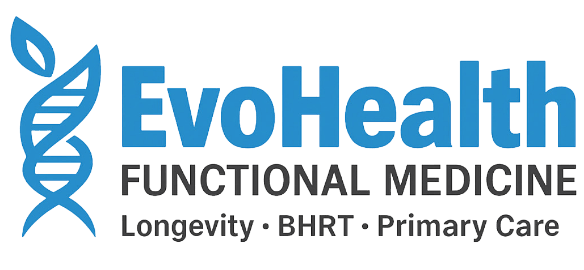Seasonal Affective Disorder
Seasonal Affective Disorder (SAD) is a form of depression that typically strikes during the fall and winter months when daylight hours are shorter. If you’re struggling with SAD, you’re not alone. In fact, millions of Americans experience the symptoms of SAD each year. However, there’s hope! EvoHealth Kansas Functional Medicine offers a holistic approach to managing SAD that can be used in combination with traditional treatments. In this blog, we’ll explore how functional medicine and lifestyle-based strategies can help you combat SAD and reclaim your well-being.

Understanding Seasonal Affective Disorder
SAD is often characterized by a range of symptoms, including fatigue, low energy, changes in sleep patterns, irritability, and a persistent feeling of sadness. These symptoms can significantly impact your daily life and overall quality of life. While the exact cause of SAD is not fully understood, it is believed to be related to the reduction in sunlight exposure during the darker months, which can disrupt your circadian rhythm and affect hormone production. Some of the key factors believed to contribute to SAD include:
- Circadian Rhythm Disruption: One of the leading theories behind SAD is the disruption of the body’s internal biological clock, or circadian rhythm. Reduced exposure to natural sunlight during the shorter days of fall and winter can lead to a dysregulation of circadian rhythms. This disruption affects the body’s sleep-wake cycle, hormone production, and other essential physiological processes.
- Melatonin Overproduction: The reduction in daylight hours can also lead to an overproduction of melatonin, which can contribute to the drowsiness and fatigue commonly experienced in SAD. Melatonin production is regulated by the body’s internal clock, and when this regulation is disrupted, it can lead to excessive melatonin secretion during the daytime.
- Dysregulation of Neurotransmitters: Key neurotransmitters, such as serotonin, norepinephrine, and dopamine, may also be involved in the pathophysiology of SAD. Dysregulation of these neurotransmitters can impact mood, energy levels, and motivation.
- Vitamin D Deficiency: Reduced exposure to sunlight can result in decreased synthesis of vitamin D in the skin. Vitamin D plays a role in various bodily functions, including immune regulation and mood. Low vitamin D levels have been associated with a higher risk of developing SAD.
- Genetic Predisposition: There is evidence to suggest that genetics may play a role in the development of SAD. Individuals with a family history of mood disorders may be at a higher risk of experiencing SAD.
- Immunological Factors: Some studies suggest that the immune system may be involved in the pathophysiology of SAD. Immune system changes, such as increased levels of proinflammatory cytokines, have been observed in individuals with SAD and may contribute to the onset of depressive symptoms.
It’s important to note that SAD is a complex condition influenced by a combination of these factors, and there may be individual variations in its pathophysiology. While the exact mechanisms are still being studied, the current understanding of SAD highlights the interplay between biological, genetic, and environmental factors in the development of this seasonal mood disorder. Treatment approaches for SAD typically focus on addressing these underlying factors and restoring the individual’s circadian rhythms and mood regulation.

Kansas Functional Medicine Approach to SAD
EvoHealth Kansas Functional Medicine takes a holistic evidence-based approach to managing Seasonal Affective Disorder (SAD) by optimizing nutrition, employing targeted lifestyle strategies, and incorporating nutraceuticals to alleviate symptoms and promote overall well-being.
1. Comprehensive Evaluation:
- Before designing a personalized treatment plan, EvoHealth Kansas Functional Medicine begins with a thorough evaluation of your medical history, symptoms, and lifestyle factors. This evaluation may include blood tests to assess nutrient levels and hormone balance.
2. Nutritional Optimization:
- EvoHealth Kansas recognizes the importance of a well-balanced diet in managing SAD. Nutritional assessments may be conducted to identify any deficiencies or imbalances.
3. Light Therapy:
- Light therapy, also known as phototherapy, is a foundational element in managing SAD. EvoHealth Kansas Functional Medicine provides guidance on the proper use of light boxes. Regular exposure to these devices can help regulate your circadian rhythm and improve mood.
4. Personalized Exercise Plan:
- Physical activity plays a vital role in combatting depression, including SAD. Dr. Tanner Wilson, DC, IFMCP works with you to develop an exercise regimen tailored to your preferences, physical condition, and specific SAD symptoms.
5. Sleep Optimization:
- Improving sleep patterns is integral to managing SAD. EvoHealth Kansas Functional Medicine helps you establish a sleep routine that supports healthy sleep patterns, which can significantly improve overall well-being.
6. Nutraceutical Interventions:
- Nutraceuticals are considered based on individual needs and evidence-based research. Options may include compounds like DHA/EPA, St. John’s Wort, S-adenosylmethionine (SAMe), Inositol, or other natural compounds that have shown promise in managing mood disorders.

Our approach to SAD management is always personalized to the individuals needs. By addressing the nutritional, lifestyle, and nutraceutical aspects of SAD, patients receive a comprehensive treatment plan that aims to alleviate symptoms, improve mood, and enhance overall well-being during the challenging winter months.
If you’re looking for a personalized, holistic approach to managing Seasonal Affective Disorder, EvoHealth Kansas Functional Medicine is your answer. Contact us today to schedule an appointment and start your journey towards a happier, healthier you.
